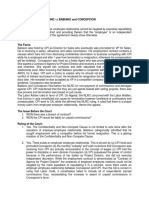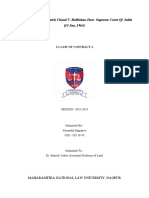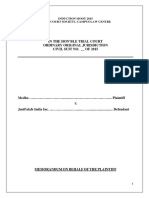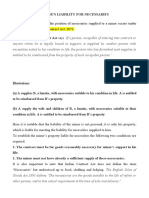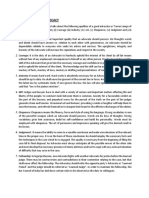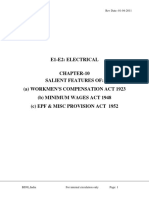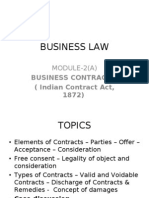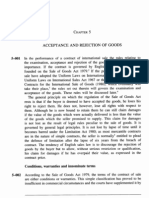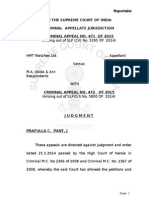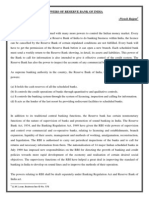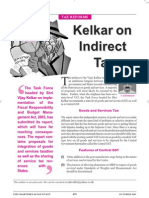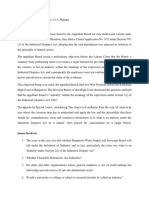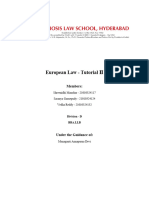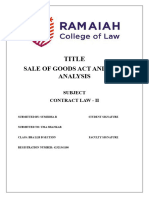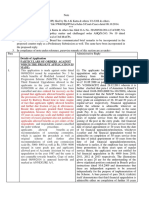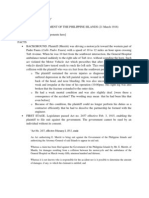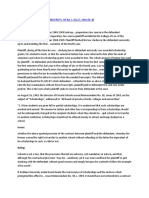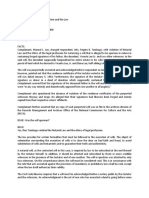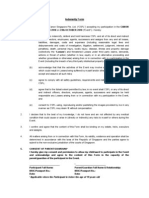0%(1)0% found this document useful (1 vote)
325 viewsMaula Bux Vs GOI
Maula Bux Vs GOI
Uploaded by
Sanchit DuggalThe Supreme Court analyzed whether forfeiture of deposits made by the plaintiff for two supply contracts was valid when the plaintiff breached the contracts. The Court found that (1) the deposits could not be considered earnest money since they were for contract performance, not price payment, and (2) the government failed to prove the deposits were a genuine pre-estimate of damages from breach or that it suffered actual loss. Therefore, the Court ruled the deposits must be returned to the plaintiff with interest.
Copyright:
© All Rights Reserved
Available Formats
Download as DOCX, PDF, TXT or read online from Scribd
Maula Bux Vs GOI
Maula Bux Vs GOI
Uploaded by
Sanchit Duggal0%(1)0% found this document useful (1 vote)
325 views2 pagesThe Supreme Court analyzed whether forfeiture of deposits made by the plaintiff for two supply contracts was valid when the plaintiff breached the contracts. The Court found that (1) the deposits could not be considered earnest money since they were for contract performance, not price payment, and (2) the government failed to prove the deposits were a genuine pre-estimate of damages from breach or that it suffered actual loss. Therefore, the Court ruled the deposits must be returned to the plaintiff with interest.
Original Title
Maula Bux vs GOI.docx
Copyright
© © All Rights Reserved
Available Formats
DOCX, PDF, TXT or read online from Scribd
Share this document
Did you find this document useful?
Is this content inappropriate?
The Supreme Court analyzed whether forfeiture of deposits made by the plaintiff for two supply contracts was valid when the plaintiff breached the contracts. The Court found that (1) the deposits could not be considered earnest money since they were for contract performance, not price payment, and (2) the government failed to prove the deposits were a genuine pre-estimate of damages from breach or that it suffered actual loss. Therefore, the Court ruled the deposits must be returned to the plaintiff with interest.
Copyright:
© All Rights Reserved
Available Formats
Download as DOCX, PDF, TXT or read online from Scribd
Download as docx, pdf, or txt
0%(1)0% found this document useful (1 vote)
325 views2 pagesMaula Bux Vs GOI
Maula Bux Vs GOI
Uploaded by
Sanchit DuggalThe Supreme Court analyzed whether forfeiture of deposits made by the plaintiff for two supply contracts was valid when the plaintiff breached the contracts. The Court found that (1) the deposits could not be considered earnest money since they were for contract performance, not price payment, and (2) the government failed to prove the deposits were a genuine pre-estimate of damages from breach or that it suffered actual loss. Therefore, the Court ruled the deposits must be returned to the plaintiff with interest.
Copyright:
© All Rights Reserved
Available Formats
Download as DOCX, PDF, TXT or read online from Scribd
Download as docx, pdf, or txt
You are on page 1of 2
Maula Bux v.
Union of India - Case Analysis
Maula Bux v. Union of India, (AIR 1970 SC 1955)
Before the Supreme Court of India
Decided on: – 19th August, 1969.
Bench: – JC Shah.
Counsel for the petitioners: – Jagdish Swarup, Solicitor-General, Yogeshwar Prasad, C.M. Kohli,
G.R. Chopra.
Counsel for respondents: – L.M. Singhvi, S.P. Nayar.
Brief facts and History of the case:-
The petitioner entered into two separate contracts with Government of India for the supply
of potatoes and other for supply of poultry,eggs, etc and deposited an aggregate amount
of 18500/- for due performance of the contract.
He committed breach of both the contracts. The contracts provided for forfeiture of the
amounts he has deposited as security for performance under each contract.
Due to plaintiff’s failure of making regular and full supplies, government rescinded the
contract and forfeited the above mentioned amount as provided in the contracts.
The plaintiff commenced an action before the court for amount of Rs 20,000/- with interest.
Issues before the court: –
Whether the money deposited by the plaintiff for due performance of the contract, be
regarded as earnest money?
Whether the forfeiture made by the government was in nature of penalty or whether Sec. 74
of Indian Contract Act, 1872 applies to the case?
Proceedings before the court:-
Trial Court:-The trial court upheld the rescission but held that government was not justified
in forfeiting the contract, as they had suffered no loss consequent on breach of contract by
the petitioner.
High Court:- In view of the he High Court, even if the deposits were held to be in the nature
of penalty, the Government is entitled on the breach of contract to receive reasonable
compensation under Sec 74 under the part “whether or not actual damage or loss was
proved to have been caused”.
The High Court awarded the plaintiff sum of Rs.416.25 with interest.
The plaintiff appealed to the Supreme Court.
Arguments for the plaintiff: –
The plaintiff primarily contended that amount deposited was not to be applied towards the
part payment of price, but was to be forfeited in case of non-performance; hence, it cannot be
regarded as earnest money.
Arguments for the respondents: –
The counsel for the union contended that amount Rs 18,500 was genuine pre-estimates the
government was likely to suffer because of breach of the contract. Hence, by virtue of Sec. 74
it should be regarded as reasonable compensation.
They further contended that the parties should be given opportunity to prove evidence
regarding damage occurred.
Under the Indian Contract Act, 1872, Section 73 and Section 74 provide for unliquidated
and liquidated damages respectively. Unliquidated Damages are the damages awarded
by the courts on the basis and assessment of actual loss or injury caused to the party
suffering breach of contract. Whereas, Liquidated Damages are the damages which the
parties to the contract may agree to, as payment of a certain amount on the breach of
contract.
The relevant parts of the sections are as follows:-
Section 73: Compensation for loss or damage caused by breach of
contract: When a contract has been broken, the party who suffers by such breach is
entitled to receive, from the party who has broken the contract, compensation for any
loss or damage caused to him thereby, which naturally arose in the usual course of
things from such breach, or which the parties knew, when they made the contract, to
be likely to result from the breach of it. Such compensation is not to be given for any
remote and indirect loss or damage sustained by reason of the breach.
Section 74: Compensation for breach of contract where penalty is stipulated
for: When a contract has been broken, if a sum is named in the contract as the amount
to be paid in case of such breach, or if the contract contains any other stipulation by
way of penalty, the party complaining the breach is entitled, whether or not actual
damage or loss is proved to have been caused thereby, to receive from the party who
has broken the contract reasonable compensation not exceeding the amount so
named or, as the case may be, the penalty stipulated for.
Finding on the basis of facts :-
Earnest money is nominal amount paid to the vendor to be applied towards the part-payment
of price, the court held the amount cannot be regarded as earnest money as it was for due
performance of the contract.
Forfeiture of earnest money does not come under Sec. 74 but if the amount is in nature of
penalty Sec. 74 applies.
The party complaining of the breach is entitled to receive reasonable compensation, whether
or not actual loss has occurred.
The Court ruled that where compensation that maybe ordered cannot be assessed, by the
court, according to established rules, the sum named by the parties if it maybe regarded as a
genuine pre-estimate maybe taken into consideration as the measure of reasonable
compensation, but not if the sum named is in the nature of penalty.
Decision of the court:-
However, as the government failed to attempt to prove that the amount was genuine pre-
estimate of damages and it had suffered any loss or damage consequent to the breach of
contract, the Supreme court decreed that the amounts deposited by plaintiff be returned to
him with interest.
Held:-
We set aside the decree passed by the High Court and substitute the following decree:-
"The Union of India do pay to the plaintiff Rs.18,500/- with interest at the rate of 3% per
annum from the date of the suit till payment."
You might also like
- Civil Law Rabuya SalesDocument87 pagesCivil Law Rabuya SalesFaith Marie Borden50% (8)
- Case Analysis NRLDocument17 pagesCase Analysis NRLVicky DNo ratings yet
- Jarantilla Jr. vs. Jarantilla-DigestsDocument1 pageJarantilla Jr. vs. Jarantilla-DigestsFrederick Barillo83% (6)
- Century Properties Inc. vs. Babiano, Et Al., GR No. 220978, July 5, 2016Document1 pageCentury Properties Inc. vs. Babiano, Et Al., GR No. 220978, July 5, 2016Mark Catabijan CarriedoNo ratings yet
- Oil and Natural Gas Corporation LTD V Saw PipesDocument5 pagesOil and Natural Gas Corporation LTD V Saw Pipeskazan kazanNo ratings yet
- Company Law Case AnalysisDocument4 pagesCompany Law Case AnalysisGurdev SinghNo ratings yet
- Chapter 4. Discharge of TortDocument31 pagesChapter 4. Discharge of TortniyatiNo ratings yet
- Standard Chartered vs. CustodianDocument6 pagesStandard Chartered vs. CustodianPranshu VatsNo ratings yet
- Residential Status Problems 2021-2022-1Document5 pagesResidential Status Problems 2021-2022-120-UCO-517 AJAY KELVIN ANo ratings yet
- Indian Evidence Act-1 PDFDocument10 pagesIndian Evidence Act-1 PDFDikshachandra100% (1)
- 253 - Case Analysis of Centre For Legal Research V - Siddharth SoniDocument13 pages253 - Case Analysis of Centre For Legal Research V - Siddharth Soniany timeNo ratings yet
- Project Contract 2nd Sem Fateh Chand Vs Balkishan DasDocument14 pagesProject Contract 2nd Sem Fateh Chand Vs Balkishan DasKaustubh Bajpayee100% (1)
- Online Dispute Resolution (Odr)Document4 pagesOnline Dispute Resolution (Odr)Diana WangamatiNo ratings yet
- Campus Law Centre Freshers Induction Moot 2015Document13 pagesCampus Law Centre Freshers Induction Moot 2015Shubham Nath33% (3)
- Topic - Elements of PartnershipDocument13 pagesTopic - Elements of PartnershipVipin BawejaNo ratings yet
- Shambhavi LRMC Notes InternalsDocument19 pagesShambhavi LRMC Notes InternalsMrityunjay ChaturvediNo ratings yet
- Hindu Undivided FamilyDocument4 pagesHindu Undivided FamilyNandkumar Chinai0% (1)
- The Provision Relating To The Position of Necessaries Supplied To A Minor Occurs Under Section 68 of The Indian Contract Act, 1872Document6 pagesThe Provision Relating To The Position of Necessaries Supplied To A Minor Occurs Under Section 68 of The Indian Contract Act, 1872Irfan bhatNo ratings yet
- Moot UpdatedDocument12 pagesMoot Updateddixitaryan2112100% (1)
- Concluded Contract: Sethia, AIR 1968 SC 1308Document3 pagesConcluded Contract: Sethia, AIR 1968 SC 1308rajarshi raghuvanshi100% (2)
- Summer Internship Report 30Document22 pagesSummer Internship Report 30Jatin SinghNo ratings yet
- ADR Negotiation Strategy PaperDocument10 pagesADR Negotiation Strategy PaperRAHUL KAMATH 1950125No ratings yet
- Clubbing of Income.Document24 pagesClubbing of Income.Deeptangshu KarNo ratings yet
- Seven Lamps of Advocacy PDFDocument1 pageSeven Lamps of Advocacy PDFVishal AnandNo ratings yet
- Registration of Firms (Ss 56-71), Chapter-VII: Law of Contracts-IIDocument5 pagesRegistration of Firms (Ss 56-71), Chapter-VII: Law of Contracts-IIShubham PhophaliaNo ratings yet
- Kaushal Kishor V State of Up Case AnalysisDocument4 pagesKaushal Kishor V State of Up Case Analysisshambhavi upadhyayNo ratings yet
- Chapter 4Document123 pagesChapter 4Satyam singhNo ratings yet
- Innoventive Industries LTD V Icici Bank Case AnalysisDocument7 pagesInnoventive Industries LTD V Icici Bank Case AnalysisRimika ChauhanNo ratings yet
- (Day 7) (Final) Commercial Courts Act, 2015 PDFDocument8 pages(Day 7) (Final) Commercial Courts Act, 2015 PDFDeb DasNo ratings yet
- The Legal Profession in IndiaDocument5 pagesThe Legal Profession in Indiaisha yogaNo ratings yet
- Case Summary CoacolaDocument2 pagesCase Summary CoacolaRahul SharmaNo ratings yet
- Hazira Deepak Poria 31102019Document1 pageHazira Deepak Poria 31102019surendra singhNo ratings yet
- Tribunalisation of Justice: Application of Droit Administratif in IndiaDocument9 pagesTribunalisation of Justice: Application of Droit Administratif in IndiaAkash AgarwalNo ratings yet
- Mahbub Shah Vs EmperorDocument2 pagesMahbub Shah Vs EmperorNaman Kumar100% (1)
- List of 20 Notable Cases of Contract Law - IpleadersDocument16 pagesList of 20 Notable Cases of Contract Law - IpleadersDhriti DhingraNo ratings yet
- PetitionerDocument21 pagesPetitionermohan kumarNo ratings yet
- Conditions Restricting TransferDocument16 pagesConditions Restricting TransferSwati Anand0% (1)
- Ongc VS Saw PipesDocument23 pagesOngc VS Saw PipesAishwarya ShankarNo ratings yet
- Chapter10. (Self - Study) Sailent Features of WCA 1923 Minimum Wages Act, EPF Act Etc.Document13 pagesChapter10. (Self - Study) Sailent Features of WCA 1923 Minimum Wages Act, EPF Act Etc.Adan HoodaNo ratings yet
- On Arbitration-3Document29 pagesOn Arbitration-3Harneet KaurNo ratings yet
- The Law of Partnership Is An Extention of Law of AgencyDocument22 pagesThe Law of Partnership Is An Extention of Law of AgencyNominee Pareek50% (4)
- Ifim Business Law m2Document129 pagesIfim Business Law m2Mv vinodkumar100% (2)
- Land Law CasesDocument9 pagesLand Law CasesNandini SinghNo ratings yet
- Chap 5. Acceptance and Rejection of Goods - 20RDocument20 pagesChap 5. Acceptance and Rejection of Goods - 20RSang Huynh100% (2)
- Case AnalysisDocument5 pagesCase AnalysisAshan ThindNo ratings yet
- Labour Law ProjectDocument16 pagesLabour Law ProjectDevendra DhruwNo ratings yet
- Course Outline - Sem V - BA BBA CPC & Limitation Act SEM V - 17Document7 pagesCourse Outline - Sem V - BA BBA CPC & Limitation Act SEM V - 17Srinilaya BajajNo ratings yet
- The Law of Partnership Is An Extention of Law of AgencyDocument21 pagesThe Law of Partnership Is An Extention of Law of AgencyHaovangDonglien KipgenNo ratings yet
- A Complaint For Dishonour of Cheque (S.138 NI Act) Cannot Be Quashed On The Ground That Cheque Was Issued As Security' SCDocument11 pagesA Complaint For Dishonour of Cheque (S.138 NI Act) Cannot Be Quashed On The Ground That Cheque Was Issued As Security' SCLive LawNo ratings yet
- Media and Ent Law RequiremntsDocument83 pagesMedia and Ent Law RequiremntsAnuj SunejaNo ratings yet
- ADR Under Sec 89 of Civil Procedure Code, 1908: A Critical AnalysisDocument3 pagesADR Under Sec 89 of Civil Procedure Code, 1908: A Critical AnalysisSatyam SinghNo ratings yet
- Ramakant Kini Vs DR L HDocument33 pagesRamakant Kini Vs DR L HSakshi JhaNo ratings yet
- Return of IncomeDocument9 pagesReturn of Incomes4sahithNo ratings yet
- Powers of Reserve Bank of IndiaDocument9 pagesPowers of Reserve Bank of IndiaPayalRajputNo ratings yet
- Kelkar CommitteeDocument6 pagesKelkar Committeedevika_verma240% (1)
- Bangalore Water Supply V A Rajappa - Brief FactDocument3 pagesBangalore Water Supply V A Rajappa - Brief FactarunNo ratings yet
- European Law - TutorialDocument6 pagesEuropean Law - TutorialVedha ReddyNo ratings yet
- The Sale of Goods Act 1930 ResearchDocument12 pagesThe Sale of Goods Act 1930 ResearchSUMEDHA RNo ratings yet
- Offences and Prosecution Under Income Tax ActDocument8 pagesOffences and Prosecution Under Income Tax Actnahar_sv1366No ratings yet
- Law Relating To Legal ProfessionDocument12 pagesLaw Relating To Legal ProfessionOmkar YenprediwarNo ratings yet
- Professional Ethics - Practical 06Document4 pagesProfessional Ethics - Practical 06Om ZingadeNo ratings yet
- Subscription Voucher: Doc Type Sub Type Number DateDocument2 pagesSubscription Voucher: Doc Type Sub Type Number Dateadarsh trivediNo ratings yet
- Section 74 of Indian Contract ActDocument9 pagesSection 74 of Indian Contract ActParshva ShahNo ratings yet
- Vol - CXVIIINo .107 PDFDocument48 pagesVol - CXVIIINo .107 PDFJamia MosqueNo ratings yet
- Form TpceaDocument11 pagesForm Tpceagarych72No ratings yet
- Sample Chart Human DesignDocument1 pageSample Chart Human DesignBimoNo ratings yet
- Maryland Corporation Name ReservationDocument2 pagesMaryland Corporation Name ReservationRocketLawyerNo ratings yet
- Ashok KattaDocument52 pagesAshok Kattausha sharmaNo ratings yet
- Topic 4 - Ancillary ClaimsDocument4 pagesTopic 4 - Ancillary ClaimsveercasanovaNo ratings yet
- On Property Verification FINALDocument51 pagesOn Property Verification FINALAdv. Shiv MishraNo ratings yet
- CPC NOTES AvnishDocument176 pagesCPC NOTES AvnishSunny AamNo ratings yet
- Home Savings & Loan Bank v. Dailo DigestDocument1 pageHome Savings & Loan Bank v. Dailo DigestAce DiamondNo ratings yet
- Articles of PartnershipDocument5 pagesArticles of PartnershipAlexiaNo ratings yet
- Merritt v. GovernmentDocument5 pagesMerritt v. GovernmentDahl Abella Talosig100% (1)
- Chalet CARETAKER AGREEMENTDocument2 pagesChalet CARETAKER AGREEMENTnathaniel avanceñaNo ratings yet
- San Miguel Properties Philippines Inc. Vs HuangDocument4 pagesSan Miguel Properties Philippines Inc. Vs HuangMabelle ArellanoNo ratings yet
- Emeterio Cui VDocument4 pagesEmeterio Cui VJun TumaladNo ratings yet
- AUTOBUS Jurisprudence - SILPDocument4 pagesAUTOBUS Jurisprudence - SILPcynemesisNo ratings yet
- Iloilo Bottlers, Inc. v. City of IloiloDocument1 pageIloilo Bottlers, Inc. v. City of IloiloRNicolo BallesterosNo ratings yet
- Case Digest Lee Vs TambagoDocument7 pagesCase Digest Lee Vs TambagoRolando Reubal0% (1)
- Indemnity Form Can On Photo Marathon 2010Document1 pageIndemnity Form Can On Photo Marathon 2010Jey JuniorNo ratings yet
- Bhavisha Offer and AcceptanceDocument8 pagesBhavisha Offer and AcceptanceShubham Jain ModiNo ratings yet
- Pakistan International Airlines Vs OpleDocument2 pagesPakistan International Airlines Vs OpleSui100% (1)
- Geagonia V CA G.R. No. 114427 February 6, 1995Document2 pagesGeagonia V CA G.R. No. 114427 February 6, 1995Lolph ManilaNo ratings yet
- Air Line Pilots Association International v. Frontier AirlinesDocument49 pagesAir Line Pilots Association International v. Frontier AirlinesMichael_Lee_RobertsNo ratings yet
- Special ProceedingsDocument2 pagesSpecial ProceedingszairaawatNo ratings yet
- Walstrom Vs MapaDocument9 pagesWalstrom Vs MapaCeslhee AngelesNo ratings yet
- Negligence Lecture 2 SlidesDocument29 pagesNegligence Lecture 2 SlidesWilliamK96No ratings yet
- Trust Account Deposit FormDocument1 pageTrust Account Deposit Formchristian09x100% (1)
- SPB068 - Electricians (Scotland) Bill 2019Document5 pagesSPB068 - Electricians (Scotland) Bill 2019msp-archiveNo ratings yet



